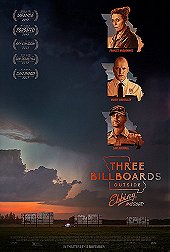Treating prickly subject matter with a carelessness and shock-and-awe grandstanding does not a great film make. No, no amount of verbal pyrotechnics about topics like racism, sexism, and culpability can mask the fact that Three Billboards Outside Ebbing, Missouri is flippant about things like character development or narrative coherency. It speaks in broad strokes, more like a caps lock, but it doesn’t engage in any of its idea in any meaningful way.
Even worse is how Three Billboards treats epithets like they’re the Molotov cocktails that Mildred hurls at the police station – moments of rage thrown out to whip a reaction out of you with no follow-through or repercussions. From accusing a pirest of “altar-boy fucking” to hurling out loaded racial language to engender a guffaw or tongue-click from its white liberal audience, Three Billboards is more about titillation than it is about engagement with its ideas and themes.
Case in point, a scene where Mildred’s ex-husband comes barreling into her home, attacks their son, and his current, younger girlfriend walks in on the altercation. There’s no payoff here. We’re told throughout that he was an abusive man, but all we get is this one scene and there’s deeper significance to this scene, there’s no reaction from his younger girlfriend other than to turn tail and walk away, it’s as if this scene exists merely to underscore’s Mildred’s reasons for anger and vigilante justice. It’s just sloppy writing. How does this scene of violence affect her son? How does this affect his relationship with his younger girlfriend?
This sloppiness extends outward as character’s make improbable 180 turns or choices that come out of nowhere. A racist cop that plays out like a bumbling idiot suddenly demonstrates not only an interior complexity that materializes out of thin air, but a brand new outlook on life that is unearned. Not to mention a brain power that we haven’t even gotten a tease about before the script needs him to suddenly be smarter. And this is all after numerous scenes of him beating up innocent civilians, including throwing one out of a window.
For all the arguments that the various players in making this film have given about how these characters aren’t actually redeemed in the end, you wouldn’t know it from the musical cues and vague enough ending that can easily read as a redemption. Individual scenes in Three Billboards work beautifully to build something thorny and jagged about tough issues, but then they turn around and fly around making choices because the script demands it not because it endemic to their character growth.
This doesn’t even begin to broach the topic of race in this movie. Here is a movie happy to talk about police brutality against minority communities and keep them largely off-screen. It reads as hollow virtue signaling and a half-formed idea. We’re merely told that these things exist and never grapple with them, and it only feeds into Mildred’s character journey of fighting the power and shaking the rafters. It’s deployed with a callousness that’s galling, or served up as a punchline, take your pick which is worse.
Where Three Billboards excels, and it really excels here, is in its trio of leading performances. Not that they can overcome the speechifying of the script, but they manage to make a meal out of its ostentatious dialog. Woody Harrelson gives us a performance that reminds us of just how underpraised an actor he is, quite possibly containing one of the largest ranges of his generation. Sam Rockwell possibly has the hardest role here as he’s the racist cop that gets the redemption without the reckoning, and he must walk that fine line. His natural charisma and decades-long character actor bona fides keep his performance moving, as does his affinity for the grooves and textures of the Martin McDonagh’s writing. It’s a showy role and Rockwell manages to make a coherent person where the script does not.
Same goes for Frances McDormand who lends her naturally flinty and gruff persona to a role that can not only carry that weight, but demands it in order to work. Mildred never asks for our sympathy or understanding, even when the film does and protects her from too harsh of consequences with her whiteness. McDormand’s performance is a late-career masterpiece from an actress that’s at her best with characters that are nearly impossible to play on the page, ones who are hard to love and go to improbably dark parts of their psyche. Even when Three Billboards fails to rise to her masterful performance, McDormand is never less than astounding to watch.
 Login
Login